The government should make citizenship teaching mandatory in primary schools, add religious education to the national curriculum and force schools to offer triple science, the government’s review has said.
Professor Becky Francis’s curriculum and assessment review, commissioned last year by the incoming Labour government, has published its recommendations.
The review also made system-wide policy recommendations on accountability, assessment and post-16 education. You can read our full round-up of those here.
But here are the review’s key recommendations for changes to individual subjects. (We’ve listed them in alphabetical order to make it easier to find specific subjects)
You can also view the curriculum review in full here.
Art and design: Clarify coursework demands
- Limited revisions to key stages 1 to 3 to clarify and exemplify the knowledge and skills pupils should develop (Accepted by DfE)
- Clarify the volume and range of coursework students are expected to produce for GCSE (Accepted by DfE)
Citizenship: Make statutory at primary school
- Introduce a statutory measure to ensure all pupils are taught a core body of essential citizenship content at primary, including elements of financial and media literacy, and climate change and sustainability (Accepted by DfE)
- Clarify the purpose and content of the key stage 1 and 2 curriculum and remove any content that duplicates the new relationships, sex and health education curriculum (Accepted by DfE)
- Update secondary programmes of study to clarify their purpose, improve specificity and improve progression from key stage 3 to 4 and GCSE (Accepted by DfE)
Computing: Replace computer science GCSE
- Provide greater clarity about what students should be taught (Accepted by DfE)
- Replace GCSE computer science with a computing GCSE which reflects the full breadth of the computing curriculum (Accepted by DfE)
- Review where digital skills and technologies have become an integral part of subject disciplines other than computing, and determine whether to include this in those subjects’ programmes of study (Not accepted – DfE has instead said it will ‘explore introducing a new level 3 qualification in data science and AI‘)
Design and technology: Sustainability and aspirational push
- Rewrite the D&T subject aims to be more aspirational and clarify the purpose of study (Accepted by DfE)
- Explicitly include how to achieve sustainable resolutions to design challenges (Accepted by DfE)
- Embed the teaching of social responsibility and inclusive design explicitly within the curriculum (Accepted by DfE)
- Support the development of critical decision-making skills about material selection (Accepted by DfE)
- Ensure that realising designs remains integral to pupils’ experience (Accepted by DfE)
Cooking and nutrition: rename the subject
- Rename the subject ‘food and nutrition’ and ensure it has its own aims and purpose of study that better reflect what it covers (Accepted by DfE)
- Ensures sufficient detail in the curriculum sets clear expectations about what should be taught at each key stage (Accepted by DfE)
- Review the level 3 vocational options for food science (Accepted by DfE)
English: Clearer purpose, oracy framework and more year 8 tests
- Ensure the English curriculum sets out a clearer purpose, with more clarity and specificity at each key stage, including clarifying the distinction between English and literacy (Accepted by DfE)
- This should include more clearly drawing out curriculum requirements for speaking and listening, as well as drama. In particular, more clarity and specificity at key stage 3 should improve coherence between primary and secondary (Accepted by DfE)
- Introduce an oracy framework to support practice and to complement the existing frameworks for reading and writing (Accepted by DfE)
- Review grammatical content to determine what content should be re-sequenced to later key stages, and what content should be removed entirely at key stage 2 to enable a greater focus on grammar in use rather than grammar in theory (Accepted by DfE)
- Replace the current grammar, punctuation and spelling (GPS) test with an amended test, which retains some elements of the current GPS test but with new tasks to better assess composition and application of grammar and punctuation (Partially accepted – DfE says it will ‘ask STA to amend the test to ensure it better reflects assessing composition and application of grammar and punctuation‘)
- Introduce a diagnostic test in English, to be taken in year 8 (Not accepted – DfE says instead it will expect all schools to assess pupil progress in writing and maths in Year 8 and will support them to select the right products to do this)
- Make significant changes to the key stage 4 English programme of study and the GCSE English language subject content, introducing greater clarity of purpose to focus English language more clearly on the nature and expression of language, and to support critical analysis of a wider variety of text types and genres, including multi-modal and ephemeral text types (Accepted by DfE)
- Review the genres specified in the English key stage 4 programme of study and GCSE English Literature subject content to ensure that students continue to study texts drawn from the recognised body of English literature and that they also benefit from studying texts drawn from the full breadth of our literary heritage, including more diverse and representative texts (Accepted by DfE)
Drama: Inclusion in English and subject content review
- Update the key stage 3 English programme of study to include a discrete section on drama (Accepted by DfE)
- Review the subject content for GCSE drama, assessment methods and the balance of assessment to ensure that the qualification is up to date, suited to the discipline and enables progression (Accepted by DfE)
Geography: Reinforce fieldwork, embed climate change more explicitly
- Make minor refinements to the programmes of study and GCSE subject content to respond to issues identified (Accepted by DfE)
- Refine content to support progression better to further study, deepen children and young people’s understanding of key geographical concepts, make content more relevant and inclusive and remove unnecessary repetition across topics (Accepted by DfE)
- Embed disciplinary knowledge more explicitly at key stage 3 (Accepted by DfE)
- Clarify and reinforce requirements for fieldwork to demonstrate its role more effectively (Accepted by DfE)
- Embed climate change and sustainability more explicitly across different key stages (Accepted by DfE)
Our full curriculum review coverage:
News story: New national curriculum pledged from 2028
What ministers said: Which recommendations will now become government policy?
Key policies round-up: Scrap EBacc, year 8 tests in English and maths, cut 10% from GCSE exam time
Subject-specific policy round-up: Mandatory citizenship, RE in the national curriculum and triple science entitlement:
Interview: Becky Francis on the big ideas in her curriculum review
History: Clarify what’s statutory, review content and assessments
- Improve the understanding and application of disciplinary knowledge and skills through additions and amendments to the disciplinary terms used (Accepted by DfE)
- Clarify the statutory and non-statutory content requirements to better support teachers in recognising and understanding the optionality that exists across key stages 1 to 3 (Accepted by DfE)
- Support the wider teaching of history’s inherent diversity, including through the analysis of a wide range of sources and, where appropriate, local history (Accepted by DfE)
- Review GCSE history subject content and assessment (including assessment objectives) to ensure understanding of disciplinary knowledge is advanced and concerns about overload are tackled (Accepted by DfE)
- Ensure that assessment is fit for purpose and aligned with the aims of the GCSE (Accepted by DfE)
Languages: Core offer at KS2, explore local approach
- Update the key stage 2 languages programme of study to include a clearly defined minimum core content for French, German and Spanish (Accepted by DfE)
- Don’t make immediate changes to the new content of the GCSEs in French, German and Spanish, but review the impact of these following the first exams in 2026 (Accepted by DfE)
- Councils, trusts and schools should explore the potential benefits of a coordinated approach in their local areas to the main language taught from key stage 2 through to key stage 4, taking account of their local context and priorities (Accepted by DfE)
Maths: Re-sequence content, refine SATs and year 8 ‘diagnostic’ test
- Retain the amount and type of content in the key stage 1 to 3 curriculum, but re-sequence it so topics are introduced in such a way that pupils can master them deeply, with opportunities for more complex problem-solving in each area, and reduce repetition in later years (Accepted by DfE)
- Ensure that maths is the subject in which pupils are exposed to mathematical concepts for the first time and the curriculum is sequenced as such (Accepted by DfE)
- Refine the current non-statutory maths test at key stage 1 to reflect any updates to the maths curriculum (Accepted by DfE)
- Consider ways to encourage more schools to use the key stage 1 test (Accepted by DfE)
- Redesign key stage 2 assessments minimally to reflect a re-sequenced curriculum and include a stronger focus on mental arithmetic and reasoning (Accepted by DfE)
- Introduce a diagnostic test in maths, to be taken in year 8 (Not accepted – DfE says instead it will expect all schools to assess pupil progress in writing and maths in Year 8 and will support them to select the right products to do this)
Music: Optimise investment to support learning instruments
- Revise the content of the programmes of study for key stages 1 to 3 to ensure a curriculum pathway which gives all pupils a rigorous foundation in musical understanding and enables broader access to further study at Key Stage 4 (Accepted by DfE)
- Explore ways to better optimise its investment in music education to support the teaching and learning of musical instruments and the reading of music to ensure equitable access to, and progression in, music education (Accepted by DfE)
- Review the music GCSE and technical award concurrently to ensure their purposes are both clear and distinct and that qualification content and assessment meet these aims (Accepted by DfE)
Physical education (PE): Redraft its aims, rename GCSE and review activity list for inclusion
- Redraft the purpose of study for PE, retaining the importance of competitive sports, but clarifying the significance of providing all pupils with opportunities to learn in a physical environment and emphasising its physical, social, cognitive and emotional benefits (Accepted by DfE)
- Redraft the aims of PE so that they are clearer and more coherent at each key stage (Accepted by DfE)
- Introduce a concise, scaffolded approach to the attainment targets and key stage subject content within the programmes of study (Accepted by DfE)
- Review how the programmes of study refer to individual activities (Accepted by DfE)
- Distinguish clearly between mandatory core PE and qualification pathways, and develop distinct terminology for each. This can be achieved by renaming GCSE PE, and considering whether any content changes are required to ensure it retains a focus on sports science (Accepted by DfE)
- The content of key stage 4 mandatory non-assessed PE should be revised to ensure that it focuses primarily on physical activity (Accepted by DfE)
- Review the current GCSE PE activity list to consider ways in which it could be made more inclusive for all students, especially for students with SEND (Accepted by DfE)
Dance: Review subject content and assessment balance
- Review how the PE key stage 1 to 4 programmes of study refer to dance, including whether they are sufficiently specific to support high-quality teaching and students’ progression, including to further study (Accepted by DfE)
- Review the subject content, balance of assessment and assessment methods of GCSE dance so that the qualification is inclusive, representative and better suited to the discipline (Accepted by DfE)
Religious education (RE): Add to the national curriculum
Add RE to the national curriculum in due course, with a staged approach taken
Stage 1
- Invite the sector to form a task and finish group, convened and led by Dr Vanessa Ogden
- Consider the legislative framework for RE, including, for example, what any changes to its status in the curriculum would mean for functions such as Standing Advisory Councils on RE (SACREs)
- A long-term plan for implementing potential changes to legislation should be drafted
- As part of this review, the DfE should consider removing the statutory requirement for learners in school sixth forms to study RE
- In parallel, the DfE should review the non-statutory guidance for RE, which has not been updated since 2010, to establish whether beneficial changes to subject content could be made in the short term that do not pre-empt the wider work the review is recommending
Stage 2
- If consensus on a draft RE curriculum can be reached, the DfE should conduct a formal consultation on the detailed content
- Alongside this, the DfE should consult on proposed changes to the legislative framework, including any proposal to repeal the requirement to teach RE in school sixth forms
(Accepted by DfE)
Science: Triple science entitlement, streamline GCSE content
- Ensure more cohesion and consistency across the primary science curriculum, including clearer guidance on what should be taught, to what depth, at each stage (Accepted by DfE)
- At all key stages, base the science curriculum on the fundamental concepts of each individual discipline so that students develop deep scientific and disciplinary knowledge and skills (Accepted by DfE)
- Consider where content can be streamlined, especially at GCSE, without affecting rigour or the subject’s knowledge-rich focus (Accepted by DfE)
- Ensure that the curriculum more clearly articulates the purpose and expectations of high-quality practical work (Accepted by DfE)
- Ensure that, in relevant areas, the science curriculum explicitly develops students’ understanding of the scientific principles that explain climate change and sustainability and the global efforts to tackle them (Accepted by DfE)
- Introduce an entitlement to triple science at GCSE, so that any student who wants to study triple science has the opportunity to do so (Accepted by DfE)


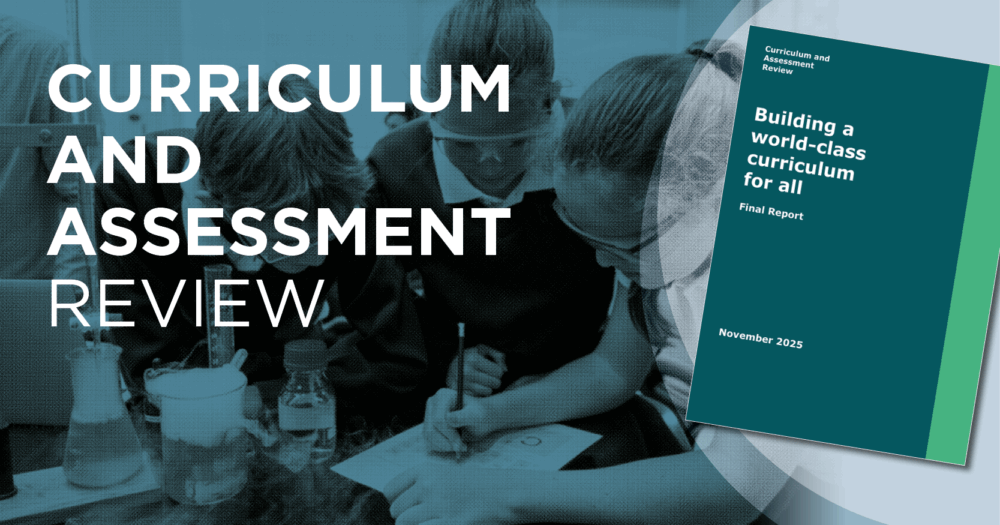

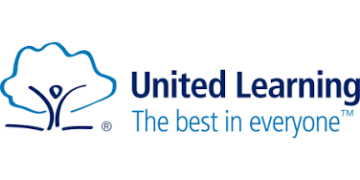





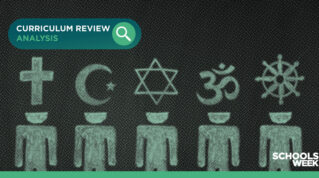
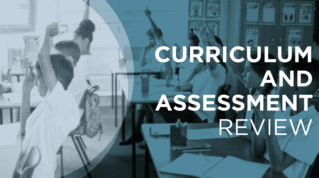
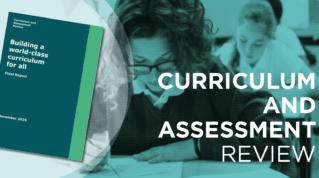

And all of the proposals neglect to tackle a major problem with the system: it’s locked into perpetuating the same old silo’d subject based approach whilst ignoring the potential of interdisciplinary project based learning to inspire, motivate students and significantly raise achievement.